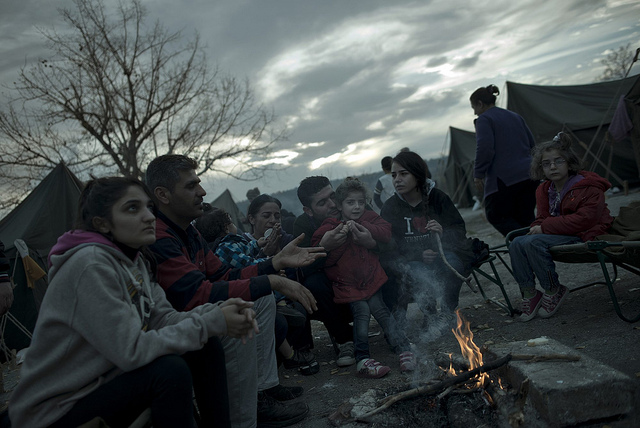632
During her Red Hawk Day convocation speech, President Susan Cole prompted newly-inducted freshmen and transfer students to use their time at Montclair State University to develop answers to some of life’s toughest questions. One of these striking questions she left unanswered for the Class of 2019 to tackle was, “How would we respond if North Africa were a boat ride away, not from Europe, but from our shores?”
I can imagine that more than one new student left Sprague Field without knowing that President Cole was referring to the ongoing refugee crisis striking Europe and that most of the attendants, not unlike their Montclair State peers and the rest of the United States citizenry, have no idea where to start looking for solutions to this massive issue.
To say that the Unites States has been less than proactive in the international efforts to aid refugees making their way from their dangerous home nations, particularly Syria, to safe places is a huge understatement. Germany, a nation about the size of California, has taken in 13,000 refugees this weekend alone, according to CNN, and plans to accept at least 800,000 this year. In comparison, the United States only plans to house 8,000 refugees total, according to Vox, of which less than 1,500 are currently residing in the United States.
Additionally, several news sources have been referring to these refugees who are fleeing for their lives as “migrants,” a pejorative term that rings of U.S. paranoia about illegal immigration and assumes that these individuals have agency where most do not. Over 250,000 civilians have been killed as a result of the civil war in Syria, Vox reports, and many refugees literally risk their lives for the chance of a better life in a more peaceful nation. After hearing reports of 71 people suffocating in the back of an abandoned truck on the way to Austria, according to Al Jazeera, and refugees who escape only to drown in the Mediterranean on makeshift boats as well as seeing horrifying images of three-year-old Aylan Kurdi’s body washed up on the shores of Turkey, it’s hard to believe that the U.S. media is publishing articles that make it seem like Syrians have any choice in trying to break out of their violent situations.
The struggles that Syrians have been undergoing are horrendous, but what is almost as terrible is the United States’ complete lack of response to the problem and failure to provide humanitarian services, especially when countries like Germany and Austria have been welcoming refugees with open arms and cheers upon arrival. A poll cited by CNN revealed that 88 percent of Germans were willing to donate clothes or money to refugees and 67 percent were willing to volunteer actively to aid the refugee situation. Is the U.S. giving these struggling individuals without home or nation the same kind of care and attention?
The answer is no. Not only is the U.S. mainly ignoring the refugee crisis, but the topic is dismissed cursorily in politics, often with insulting comments like Representative and Homeland Security official Michael McCaul’s claim that refugees might bring danger to U.S. soil because of the threat of extremism.
America was largely founded by refugees seeking religious asylum from oppressive governments. But, because the people who are in need of asylum now are from the Middle East, the United States is turning a blind eye to those who are similar to our own forefathers.
Since our government is failing the Syrian people, the only thing we can do is try to make a difference in whatever way we can in our own individual lives. Share what you know with others. Use social media to let the world know about Syrian refugees and their struggles. Donate through secure organizations to sponsor refugee families and deliver supplies and resources to those less fortunate. Listen carefully to those hopeful to win a nomination in 2016 and carefully decide which politician will not let these injustices go unnoticed.
President Cole’s charge to students goes out to the entire Montclair State community. Will you become part of the solution or continue to contribute to the problem of covering up the refugee crisis?




